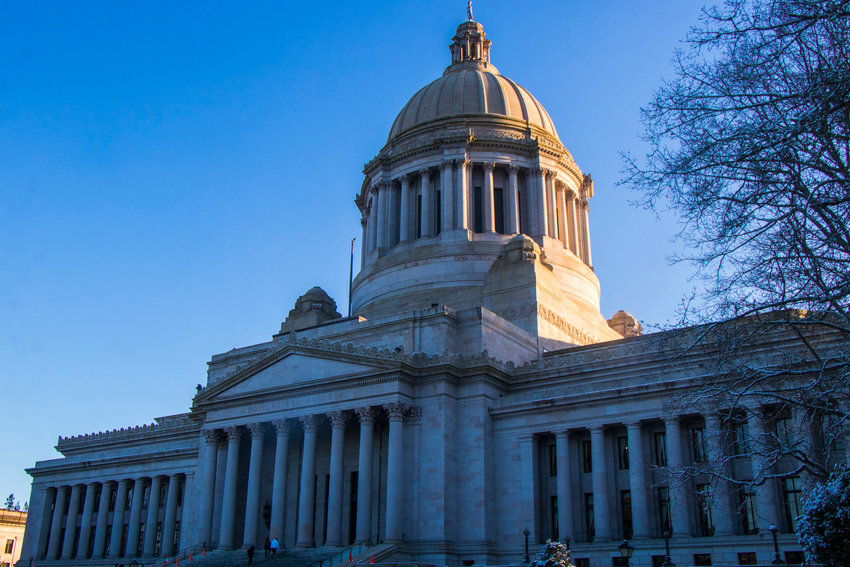When a bill that would cap annual rent increases at 7% cleared the Washington House last month, housing advocates cheered. They viewed it as a measure that would help stymie evictions and keep tenants in their homes. But on April 10, the Senate made changes to the legislation that alarmed those same advocates, who now fear that the Senate version could harm the very people whom the bill is meant to help.
“The difference between what the House passed and what the Senate passed is so extreme,” said Michele Thomas, policy and advocacy director for the Washington Low Income Housing Alliance. Thomas said Thursday that the Senate gutted the initial bill, and that the changes would cause evictions and increase homelessness. The Senate’s version of House Bill 1217 would raise the yearly allowable rent hike for residential tenants from the House’s proposed 7% cap to a 10% cap plus consumer price index, a measure of inflation.

Data sent to McClatchy by Thomas’ organization shows that last year, a rent increase of 10% plus CPI would have translated to a more than 13% spike. For a rent of $1,830, that monthly increase would equal $241.56, bringing the new monthly rent to $2,071.
56. Another Senate amendment would exempt certain single-family homes, which Thomas’ group said would apply to about 38% of renter households statewide. That would have a disparate effect on families with kids, multi-generational households, and tenants who live in smaller towns and communities, Thomas said.
Thomas’ group wants House Democrats to rebuff the Senate’s changes through what’s known as the concurrence process. Advocates are calling for a final bill with a yearly rent-increase cap of 7% for residential tenants and 5% for manufactured homeowners. The group also wants to ensure that renters in single-family homes aren’t excluded.
Some 75 to 100 people rallied at the state Capitol Friday afternoon at an event sponsored by Thomas’ organization. Renter Claudia Franson of Vancouver told McClatchy at the rally that she’s lived in a single-family home for five years. The mother of seven said she’s worried it’ll get to the point when she can no longer afford her house.
Even a 7% rent hike would be a struggle. Franson said her place is the right home for the size of her family. “If I have to leave one day, that would definitely make us homeless,” she said.
“There’s no other place that I believe would be suitable for my children if this keeps going and rising.” State Sen. Alvarado, a West Seattle Democrat and the bill’s prime sponsor, said in an interview that the upper chamber’s amendments watered down the original bill’s protections.
The bill had aimed to help make rent increases more predictable so that folks can live with more stability. “These are tough times,” she said. “It’s hard to afford the rent, and I believe that people should be able to know how high their rent will go, and to have protections on how high their rent will go.
” Alvarado wants lawmakers to pass a bill offering substantial protections to the nearly 40% of Washingtonians who are renters and manufactured homeowners. She thinks lawmakers should demonstrate their commitment to hardworking people and “older adults who just want to be able to live with dignity.” “Throughout the process, we have made significant compromises,” Alvarado said.
“We’ve listened to diverse perspectives, and we’ll continue to do that, and I hope we get a meaningful piece of legislation off the floor.” House Speaker Laurie Jinkins told reporters Thursday that the Senate amendments aren’t welcomed by many of her caucus’ members. “My guess is there are conversations going on between members here, members there, about where is a good — the right landing spot,” the Tacoma Democrat said at a media availability.
“I’ve been working on a lot of things, and so I’ll hear back at some point as people get closer to a resolution or get to a spot where they’re stuck. I have not heard either of those things yet.” Thomas noted that Washington’s rents are among the highest in the nation.
A 10% rent increase alone would be destabilizing to the vast majority of tenants, but the CPI inflation factor on top “adds another wild card.” It strips the predictability component from the bill, she said. Inflation has been quite high in recent years, Thomas said.
She fears it could potentially skyrocket amid federal-government uncertainty, tariffs and threats of a looming recession. Thomas cited a recent poll that suggests the vast majority of Washingtonians, 81%, support capping rent hikes. Lawmakers still have a chance to correct course and pass a policy that addresses the state’s growing homelessness and housing-insecurity crisis, she said.
“That is the top issue for so many voters across the state,” Thomas said. “Lawmakers only have a week from Sunday to get it done, and it’s coming quick. It’s coming quick.
” The 2025 legislative session is scheduled to end April 27. © 2025 The News Tribune (Tacoma, Wash.).
Visit www.TheNewsTribune.com.
Distributed by Tribune Content Agency, LLC..
Top

Housing advocates say Washington state Senate version of rent-cap bill 'guts' tenant protections

When a bill that would cap annual rent increases at 7% cleared the Washington House last month, housing advocates cheered. They viewed it as a measure that would help stymie evictions and keep











